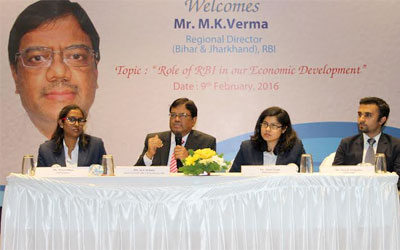 Ranchi, Jharkhand | February | 09, 2016 :: As the part of 8th Diamond Jubilee Lecture Series of XISS, Ranchi a lecture on “Role Of RBI in our Economic Development”. The Reserve Bank of India, Patna organised e-BAAT, an electronic banking cum financial awareness programme at Xavier Institute of Social Service (XISS), Ranchi on February 09, 2016 in an endeavour to promote the usage of the e-mode for banking transactions and shift towards a less cash and paper less economy. The programme was chaired by M K Verma, Regional Director, RBI, Bihar and Jharkhand and was attended by Dr. Fr. Alexius Ekka, Director, XISS, Dr. Fr. Ranjit Toppo, Assistant Director, various HoDs & faculty members of XISS, Prof. S. R. Shauq, Dr. M.H. Ansari, Prof. A. R. Bodra, Dr. Ratnesh Chaturvedi, Prof. S.N.Singh, Dr. Amar E. Tigga, Smt. Shailaja Singh, AGM, RBI Patna and officers from Ranchi office of RBI. The programme received an audience of around 200 participants comprising of students and teachers from XISS, Ranchi.
Ranchi, Jharkhand | February | 09, 2016 :: As the part of 8th Diamond Jubilee Lecture Series of XISS, Ranchi a lecture on “Role Of RBI in our Economic Development”. The Reserve Bank of India, Patna organised e-BAAT, an electronic banking cum financial awareness programme at Xavier Institute of Social Service (XISS), Ranchi on February 09, 2016 in an endeavour to promote the usage of the e-mode for banking transactions and shift towards a less cash and paper less economy. The programme was chaired by M K Verma, Regional Director, RBI, Bihar and Jharkhand and was attended by Dr. Fr. Alexius Ekka, Director, XISS, Dr. Fr. Ranjit Toppo, Assistant Director, various HoDs & faculty members of XISS, Prof. S. R. Shauq, Dr. M.H. Ansari, Prof. A. R. Bodra, Dr. Ratnesh Chaturvedi, Prof. S.N.Singh, Dr. Amar E. Tigga, Smt. Shailaja Singh, AGM, RBI Patna and officers from Ranchi office of RBI. The programme received an audience of around 200 participants comprising of students and teachers from XISS, Ranchi.
The programme began with an introduction and welcome of address by Smt. Shailaja Singh, AGM, RBI, Patna. She gave a brief overview of the e-BAAT programme and the benefits of using alternate delivery channels for doing our day to day banking transactions. She added that the RBI has been promoting access and inclusion through payment system literacy initiatives under Electronic Banking Awareness and Training (e-BAAT) and underscored the importance of e-mode of banking for reaping the benefits of seamless, faster and convenient banking. Shri. M.K. Verma, Regional Director of Bihar and Jharkhand, RBI, thereafter, inaugurated the programme and also delivered the Keynote Address on the occasion.
In his address, Shri. Verma mentioned that he would attempt to ‘demystify’ the Reserve Bank by providing a simple account of its core and visible functions stating that as a public policy institution, we have a responsibility to communicate with people and explain to them our policies and how these policies make a difference to their lives. He said that while most people think that the only job of the RBI is to print currency, it actually performs several other functions such as monetary management, currency management, foreign exchange and reserves management, government debt management, financial regulation and supervision, apart from acting as the banker to the banks and to the Government. Financial Inclusion under the larger ambit of development has also become a very important agenda for the Reserve Bank, which distinguishes us from other central banks.
Shri Verma mentioned that technology has caused a huge revolution in banking. He said that both internet banking and mobile banking have been picking up well over the past few years. But people also have to gain confidence in e-banking before they make use of it in a big way and the banks have a big role to play in this regard. The RBI is the regulator and supervisor the payment and settlement system in the country. Safe and efficient functioning of these systems is an important pre-requisite for the proper functioning of the financial system and the efficient transmission of monetary policy. The RBI has been initiating reforms in the payment and settlement systems to ensure efficient and faster flow of funds among various constituents of the financial sector. RD informed about the development of the payment systems like ECS, EFT, NEFT and RTGS in the country and the trends in the payment systems in the country including Cheque Truncation System (CTS).
In the next part of his address Shri Verma focused on the growth of ATMs, debit cards, credit cards and e-wallets in the country. He said that mobile banking has brought the bank to the fingertips of the people allowing them anytime and anywhere banking. He explained the Do’s and Dont’s and safety features to be adopted while doing internet banking transactions, using debit cards, credit cards, etc. He added that simple steps such as registering for mobile alerts could make it easy to monitor transactions in one’s account. Further, every payment system had a certain discipline and protocol which has to be followed to safely and successfully conduct transactions. He advised the audience to get credit card statements by e-mail and SMS so they could be alerted even if they were on the move.
RD explained about the functions of the Department of Banking Supervision, mechanism of Risk-Based Supervision, on-site and off-site inspection and how the banks can also be penalised for violating RBI guidelines. He elaborated on the meaning of differentiated banking and said that the banking structure in the country would change with two new universal banks already beginning operations and in-principle license granted to 11 Payments Banks and 10 Small Finance Banks adding that the RBI is trying to instill more competition into the banking system. He explained the differences between banks and NBFCs and the Do’s and Dont’s to be followed while dealing with NBFCs. He elaborated on the role played by the NBFCs in our financial system and the regulatory and supervisory framework for the NBFCs. He concluded his address by mentioning the steps being taken by RBI to encourage greater lending by banks to the MSMEs, particularly the first generation borrowers. He mentioned that the micro enterprises faced difficulties in accessing bank funding and how the setting up of the Small Finance Banks would lead to a greater flow of fund to micro and small finance borrowers.
The programme was quite interactive with good number of queries put forth by the students which were aptly answered by Regional Director from RBI. The students and teachers of XISS, Ranchi well appreciated the initiative taken by RBI.



